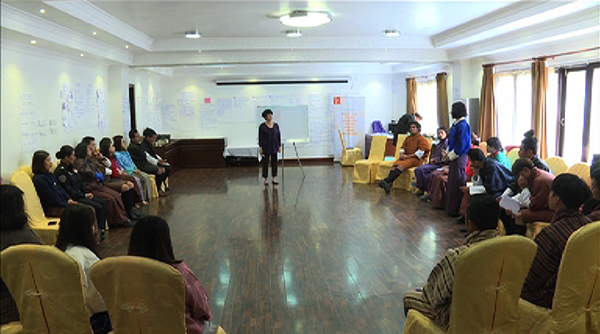 A project called Gakyid-Lamtoen or Bhutan Pilot: Addressing Violence Against Women and Children seeks to prevent gender-based violence or GBV in Babesa community, Thimphu.
A project called Gakyid-Lamtoen or Bhutan Pilot: Addressing Violence Against Women and Children seeks to prevent gender-based violence or GBV in Babesa community, Thimphu.
It will do so with the help of facilitators comprising adolescents and caregivers. They were trained and empowered with skills necessary to take the project forward at a ten-day Facilitator’s Training Program last month.
The idea is that they will meet with the people of Babesa once every month after the training to engage with the community to build violence-free families. Through various initiatives, the facilitators will expose the community to positive activities and messages around gender equality, non-violent relationships, and positive coping and resilience strategies.
Sonam Yangden is one of the adolescent facilitators. “One of the things we are trying to do at this workshop is learning ways to help caregivers and adolescents understand each other and to use better language to communicate with each other,” she said.
“Positive disciplining is one of the skills we are learning,” Reena Thapa, another facilitator said.
The facilitators will be at the forefront of the project that aims to enable Babesa community in Thimphu to lead its own violence prevention program.
It was found that the protection system surrounding women and children in need of care and support is secondary or tertiary service or response is driven, meaning help or assistance arrives only after violence. The pilot project, a first of its kind, aims to tackle this by addressing social norms that underpin GBV to promote safe, happy, and equitable families.
A recent national survey on the prevalence of violence against women and girls found that more than two in every five Bhutanese women and girls above 15 have experienced one or more forms of partner violence in their lifetime. This project is expected to help improve the situation.
“The survey has just been released, which I think highlighted some of the issues around GBV and the team has been extraordinarily driven and motivated to find ways to prevent GBV and also violence against children because the two are interrelated,” Anik Gevers, the UNDP Technical Advisor to the project said.
“If we stop violence against children, it will help in ending violence against women as well.”
The pilot project in Bhutan is one of the seven pilots across the world supported by UNDP and the Republic of Korea global initiative focused on the integration of actions to address GBV.
The three-year project is being implemented by NCWC in partnership with RENEW, Royal Bhutan Police, Thimphu Thromde. It is supported by UNDP.
“We hope that this project will contribute to the ways people think about violence at homes, how we really want homes without violence and what it means to have a family without violence and how we can make that happen,” Koh Miyaoi, a gender advisor from UNDP Asia Pacific office said.
“We really hope that this project will also contribute towards helping people understand what role we can play in ensuring our homes and communities are free of violence.”
The pilot will test localized adaptations of evidence-based primary prevention and response approaches and will be rigorously evaluated so these approaches can be further refined and scaled-up across Bhutan.







